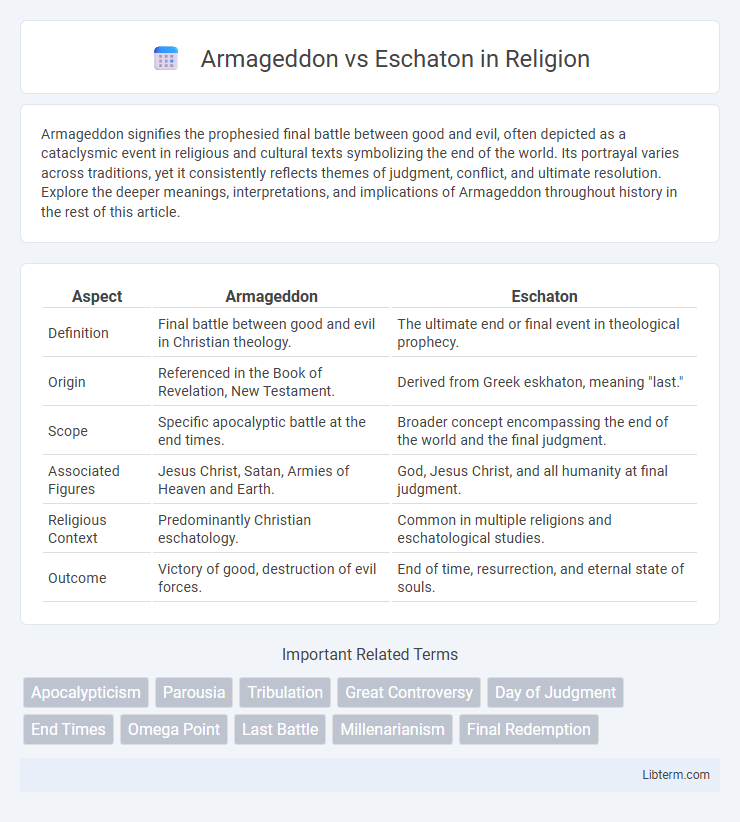Armageddon signifies the prophesied final battle between good and evil, often depicted as a cataclysmic event in religious and cultural texts symbolizing the end of the world. Its portrayal varies across traditions, yet it consistently reflects themes of judgment, conflict, and ultimate resolution. Explore the deeper meanings, interpretations, and implications of Armageddon throughout history in the rest of this article.
Table of Comparison
| Aspect | Armageddon | Eschaton |
|---|---|---|
| Definition | Final battle between good and evil in Christian theology. | The ultimate end or final event in theological prophecy. |
| Origin | Referenced in the Book of Revelation, New Testament. | Derived from Greek eskhaton, meaning "last." |
| Scope | Specific apocalyptic battle at the end times. | Broader concept encompassing the end of the world and the final judgment. |
| Associated Figures | Jesus Christ, Satan, Armies of Heaven and Earth. | God, Jesus Christ, and all humanity at final judgment. |
| Religious Context | Predominantly Christian eschatology. | Common in multiple religions and eschatological studies. |
| Outcome | Victory of good, destruction of evil forces. | End of time, resurrection, and eternal state of souls. |
Understanding Armageddon: Definitions and Origins
Armageddon, derived from the Hebrew term "Har Megiddo" meaning "Mountain of Megiddo," refers to the prophesied site of the final battle between good and evil in Christian eschatology. This concept originates primarily from the Book of Revelation in the New Testament, symbolizing a decisive confrontation leading to the end of the world. Unlike Eschaton, which broadly denotes the ultimate event in time marking the end of history, Armageddon specifically highlights the apocalyptic war preceding this final outcome.
Eschaton Explained: The Ultimate Final Event
Eschaton represents the ultimate final event in theological and philosophical contexts, signifying the culmination of history and the final judgment, where all existence transitions into a new divine order. Unlike Armageddon, which specifically refers to the prophesied apocalyptic battle, Eschaton encompasses a broader scope including resurrection, eternal destiny, and the restoration of creation. This concept is central in eschatology, emphasizing ultimate reconciliation and the fulfillment of divine purpose beyond temporal destruction.
Historical Context: Armageddon in Religious Texts
Armageddon, derived from the Hebrew "Har Megiddo," is prominently featured in the Christian Book of Revelation as the location of the final battle between good and evil, symbolizing the ultimate confrontation before the end of the world. This concept has roots in Jewish apocalyptic literature, where Megiddo was historically a strategic battlefield, lending significant eschatological weight to the term. The historical context of Armageddon in religious texts emphasizes its role as a divinely ordained site of cosmic judgment and the culmination of divine prophecy.
Theological Perspectives on the Eschaton
Theological perspectives on the Eschaton emphasize it as the ultimate culmination of history, where divine judgment and the fulfillment of God's kingdom occur. Unlike Armageddon, which is often viewed as a specific apocalyptic battle, the Eschaton encompasses the broader context of final resurrection, eternal life, and cosmic renewal. Various Christian traditions interpret the Eschaton through scriptural prophecies, highlighting its role in God's redemptive plan and the restoration of creation.
Armageddon vs Eschaton: Key Conceptual Differences
Armageddon refers specifically to the prophesied final battle between good and evil, often depicted in religious texts as a decisive, apocalyptic conflict. Eschaton encompasses a broader concept of the ultimate end of the world or the final event in the divine plan, including resurrection, judgement, and the establishment of a new order. While Armageddon is the climactic war within eschatological narratives, Eschaton represents the total culmination of all end-time events and theological fulfillment.
Symbolism and Interpretations Across Cultures
Armageddon symbolizes the ultimate battle between good and evil, often depicted as a climactic event in Christian eschatology representing divine judgment and the end of the world. Eschaton, a broader term in theological discourse, refers to the final event in the divine plan encompassing the end times and the fulfillment of history across various religions. Interpretations vary culturally, with Armageddon emphasizing apocalyptic conflict while Eschaton embodies the transformative culmination of existence, reflecting differing narratives of chaos, renewal, and cosmic order.
Prophecy, Apocalypse, and End Times Narratives
Armageddon, rooted in biblical prophecy, represents the prophesied final battle between good and evil signaling the apocalypse and imminent end times. Eschaton encompasses the broader theological and philosophical concept of the ultimate culmination of history, including resurrection, judgment, and the establishment of a new divine order. Both narratives shape eschatological frameworks by emphasizing transformational events that bring about the transition from temporal existence to eternal destiny.
Influence on Popular Culture and Media
Armageddon often symbolizes a cataclysmic battle leading to the end of the world, heavily influencing films, video games, and literature with apocalyptic themes centered on final warfare and survival. Eschaton, rooted in theological concepts of ultimate destiny and divine judgment, appears more frequently in philosophical and speculative fiction, emphasizing themes of cosmic order and ultimate resolution. Both terms shape popular culture, but Armageddon's dramatic, action-oriented imagery dominates mainstream media, while Eschaton informs more nuanced explorations of existential and metaphysical conclusions.
Philosophical Reflections on Finality and Destiny
Armageddon symbolizes a catastrophic final battle marking the ultimate end of worldly existence, emphasizing themes of destruction and judgment. Eschaton represents the theological and philosophical concept of the final event in history, often associated with the fulfillment of destiny and cosmic resolution. Philosophical reflections on these terms explore the tension between inevitable finality and the hope for transcendence or renewal beyond temporal limits.
Contemporary Relevance: Lessons from Armageddon and Eschaton
Armageddon symbolizes apocalyptic conflict and ultimate judgment, serving as a powerful metaphor in contemporary discussions on global crises such as nuclear warfare and climate change. Eschaton, representing the end of time or final event in theological and philosophical contexts, highlights humanity's quest for meaning and hope amid existential uncertainty. These concepts encourage critical reflection on collective responsibility and the necessity for sustainable solutions to prevent catastrophic outcomes.
Armageddon Infographic

 libterm.com
libterm.com